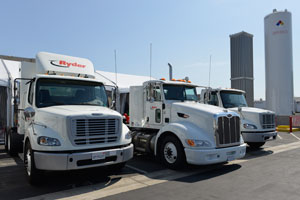Ryder signs natural gas lease deal
Ryder System Inc., a leader in commercial fleet management and supply chain solutions, announced today that C.A.T. Inc. has signed a full-service lease agreement for 100 compressed natural gas (CNG) sleeper tractors.
This is Ryder’s first natural gas lease customer in Canada and its largest single natural gas vehicle customer to date. C.A.T., a truckload carrier based in Coteau-du-Lac, Quebec, Canada, will use the trucks in its delivery fleet that travels from Montreal, Canada to Laredo, Texas.
C.A.T. has served the shipping public between Canada and the United States since 1978 and provides transportation services to major corporations within the automotive, food, beverage, and consumer packaged goods (CPG), and electronic industries.
Ryder will also provide maintenance for the 100 CNG vehicles from Ryder’s Montreal service facility, which is being upgraded for compliance with natural gas standards.
“Ryder’s investment in natural gas vehicles and maintenance infrastructure began with a pilot project in Southern California, and has grown to be one of the largest commercial natural gas vehicle programs in North America,” said Ryder President of Global Fleet Management Solutions Dennis Cooke. “As we continue to expand our natural gas vehicle footprint, we are able to help more businesses convert their fleets to this cost-effective and environmentally-friendly advanced fuel solution.”
C.A.T. has been leasing trucks from Ryder for the past eight years. Ryder will replace almost one-third of C.A.T.’s fleet of 325 vehicles with 100 CNG sleeper tractors. The natural gas fleet is expected to have a carbon emissions reduction of 2,564 metric tons.
“C.A.T.’s natural gas fleet program will enable us to be extremely successful in supporting our customers’ sustainability efforts. We are excited to work with Ryder to transfer our diesel fleet to a CNG fleet in Canada,” said C.A.T. President Daniel Goyette. “With Ryder’s natural gas vehicle and maintenance expertise, we have the confidence that we can get the service and performance we need from our fleet today, while operating more cost-efficiently and environmentally-friendly.”






